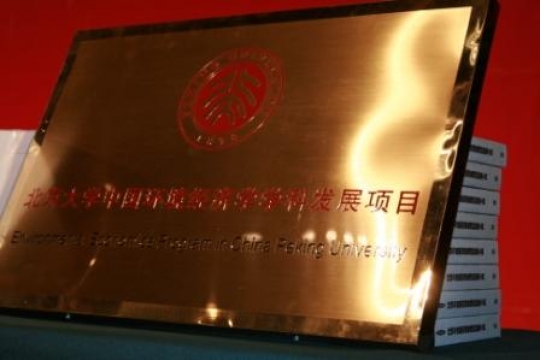The Environmental Economics Program in China (EEPC) relocated to the National School of Development in 2013.
EEPC was set up in the College of Environmental Science and Engineering, Peking University in January 2007. It is one of the original six Environment for Development (EfD) centers worldwide sponsored by the Swedish International Development Cooperation Agency, Sida with academic and administrative support from the University of Gothenburg, Sweden.
The Launching Ceremony of the EEPC took place on October 29, 2007.
In 2018, EEPC has been formally housed at the China Center for Environmental and Energy Economics (CCEEE or C2E3) affiliated to the National School of Development (NSD), Peking University. This is a milestone in institutional development for us as the EfD China and EfD initiative are better acknowledged and further involved in research, policy communication and capacity building activities in NSD, and more excellent researchers from other academic institutions, such as the China Academy of Sciences, are brought to CCEEE and EEPC. Meanwhile, for CCEEE the organizational form of EEPC helps expand academic and policy outreach, whilst strengthening financial stability via collaboration with diversified funding sources.
The goals of EEPC are three-fold: building capacity of rigorous economic analysis into environmental policy in China, policy outreach, and graduate education that emphasizes systematic training in modern environmental economics.
EEPC will be financially supported by Sida (through the University of Gothenburg) in the coming 3-5 years. The EEPC faculty and students, with support from the Environmental Economics Unit of the University of Gothenburg, will develop productive international collaboration with distinguished scholars and institutions (e.g. Resources for the Future) in order to advance its academic exploration in modern environmental economics.
Peking University is one of the pioneer teaching and research institutions in the field of environmental economics, which started in 1988. It has been the key institution for environmental economics and policy research and education. The environmental economics and policy program has made tremendous contributions to the advancement of environmental sciences as well as policy making. Many policy recommendations have been adopted by the government. Faculty members of Peking University have been active in the process of international environmental agreements, and have played important roles in international organizations dealing with global environmental issues.
EEPC in its short existence has produced results ranging across the fields of environmental economic valuation, pollution control policy, regional environmental management, poverty and the environment, tenure reform of collective-owned forest, reform of state-owned forest, agricultural carbon sequestration, and the international environment agreement compliance mechanism.
History and Organization
EEPC, headed by Professor Xu Jintao and initiated in 2002, was originally affiliated with the Center for Chinese Agricultural Policy, Chinese Academy of Sciences. In the spring of 2006, EEPC relocated to the College of Environmental Sciences, Peking University. Core funding is provided by Swedish Sida, via collaboration with the Environmental Economics Unit, Department of Economics, University of Gothenburg, Sweden. In 2007, affiliated with the reorganized College of Environmental Sciences and brand new College of Environmental Sciences and Engineering, EEPC was launched to the public.
The organization of EEPC is made up of an academic advisory committee, research fellows, adjunct and visiting scholars, Post-doctoral researchers, and Ph.D. and Master's students.
Objective
The overall objective is to improve welfare among poor people in developing countries by preventing pollution and natural resource depletion and promoting sustainable use of natural resources and ecosystems through the use of environmental economics tools. Points of departure for the program include the Swedish Policy for Global Development, the Paris Declaration, and the Millennium Development Goals.
The aim of the program is to build capacity in modern environmental economics in China. By doing so it is expected that program staff will be able to conduct a rigorous economic analysis of environmental issues facing developing China. Environmental economics offers possibilities to enhance government decision-making, contribute to poverty alleviation, and promote environmental justice. To enhance such a development, the specific objectives are to (i)strengthen environmental economics capacity in key counterpart institutions, primarily key government ministries, agencies, and universities; (ii) increase the scale and quality of academic training and policy-relevant research; (iii) strengthen the links between academic resource persons, planners, and decision-makers; and (iv) enhance the integration of environmental economics and strategic environmental assessment in development cooperation, particularly Swedish.
Research Capacity
Currently, EEPC focuses on applied policy research. In particular, it attempts to address policy needs in conducting a social and economic assessment of ongoing public programs and the transformation of state-owned forest enterprises and central forestry authority. Issues under investigation by EEPC include national forest management, forest governance in collective forests, collective forest tenure reform, pollution control policy, environmental indicators, water and soil conservation, as well as water resource allocation. With these efforts, EEPC has contributed to the design of a policy framework that aims at improving economic performance while maintaining sustainable use of forest resources in forest areas. All involved research fellows have rigorous modern economics training and aspire to perform rigorous environmental economic analysis. Over the past two years, staff members have published 12 peer-reviewed journal papers, edited 10 books (both in English and in Chinese), and made more than 20 international conference presentations. Staff members have taught at Peking University in China.
